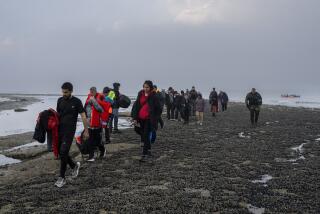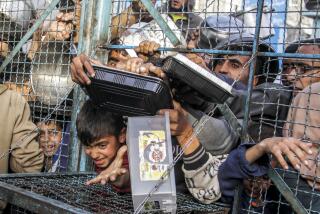Fractured Iraq Offers Smugglers an Opening
- Share via
BASRA, Iraq — A smile spreads across the face of Lt. Col. Abdulameer Mohammed, a customs police official in this southeastern port city, as he gives an accounting of his staff’s recent bonanza: One hundred and seventy-two cases of Johnnie Walker Red Label whiskey. Six hundred premium sheep. Four cases of new Iraqi dinar bank notes, worth more than $500,000.
The contraband was intercepted as smugglers tried to transport it across the Iraqi-Kuwaiti border. Such traffic, in both directions, is common as criminals take advantage of the chaotic aftermath of the war that toppled Saddam Hussein.
“It’s a serious problem,” said Mohammed, who runs the southern regional headquarters of Iraq’s new Customs Police Department. “Since the collapse of the regime, everything has collapsed.”
Smugglers are stealing everything from alcohol, livestock and scrap metal to the new Hussein-free currency. Other popular items, banned for export by the Coalition Provisional Authority, or CPA, include antiques and foodstuffs such as tea, sugar and milk, and the shoots of the country’s valuable date palms.
But of all the contraband seeping across Iraq’s porous borders, oil has proved to be the most profitable -- and the most difficult to curtail.
Iraq holds the world’s second-largest oil reserves after Saudi Arabia. CPA officials estimate that Iraqi smugglers steal up to $200,000 worth of oil a day.
Some smugglers simply punch a hole in a remote pipeline and fill up their tankers. Others buy fuel from corrupt gas station attendants.
A highly organized, well-funded smuggling racket was in full swing under Hussein as his regime tried to circumvent international trade sanctions, coalition officials said. The network is still at least partially in place, the officials added.
The smugglers use cars, trucks, tankers and boats to transport their booty. British naval forces, stationed in Basra, are helping to retrain Iraq’s formerly disbanded river police into a sort of coast guard, whose task it is to patrol the Shatt al Arab waterway that meanders 120 miles along the border with Iran.
A Frustrating Fight
Local law enforcement officials grumble that progress in tackling smuggling is too slow. They complain that their agencies lack adequate weapons and equipment to challenge smugglers, who have access to high-tech artillery and sophisticated means of communication.
“British troops are taking a long time to control the borders,” said Brig. Mohammed Kadhim Ali, commander of the Basra police department, which has been handed greater responsibility for dealing with smuggling. “During this time, our economy will be destroyed.”
Ali said his department has been confiscating at least $1 million a day in smuggled dinars. It is unclear why thieves would want to steal a currency that cannot be converted or used outside Iraq. But Ali speculated that they are saboteurs who plan to save the funds and then later flood the Iraqi market in hopes of devaluing the currency.
Some critics argue that the CPA is cutting would-be smugglers too much slack as it sets up a new border patrol system. Customs police are part of the border patrol and work alongside traditional customs agents.
Because of a moratorium on imposing customs duties until the border enforcement authority is fully in place, the job of customs officials these days is primarily to search for weapons and drugs and other illegal goods, as opposed to exacting fines.
Hindi Jabber, the assistant manager for the Abu Floos port, about nine miles south of Basra, said the customs regulations make his agency feel toothless.
“Before, our authority started at the gate to the port,” Jabber said. “We controlled everything. [Now] we are suffering from the fact that the customs authority is not playing its real role. The coalition troops are not giving us the real authority we need.”
Coalition officials acknowledged that some disarray was inevitable as the new border enforcement authority is established and the power of certain offices and departments is redistributed. The responsibility of some Hussein-era customs officers is being pared down and they will eventually be laid off, the officials say.
The establishment of proper diplomatic relations and international commercial trade agreements between Iraq and other countries would also help reduce smuggling, coalition officials said. Without such agreements, captains piloting barges with smuggled goods could simply travel into other nations’ waters to avoid capture by Iraqi authorities.
“What we’re trying to do is get the Iraqi system to stand on its own feet,” British Maj. Tim Smith said. “Otherwise, what can happen is you create a kind of dependency system.”
Emphasis on Security
Coalition officials have emphasized handing back responsibility for security as one of the key elements to ensuring that Iraq fully regains its sovereignty.
That includes revamping the Iraqi judiciary to ensure that criminals are punished.
“The old regime was very strict and [even] they were not able to completely stop them,” said Mohammed, the customs police official. “What about under these circumstances? It’s impossible to stop them.”
Ali, the Basra police commander, agreed: “Now we don’t have punishment, we don’t have proper law, we don’t have anyone controlling [the situation].”
Under Hussein, unauthorized smugglers could face the death penalty, Mohammed said. So smugglers would rarely surrender. They would either fight to the death, or simply abandon the loot and flee.
Today, arrests and confiscations haven’t made much of a dent in the smuggling trade. The sheep and currency thieves, apprehended by Mohammed’s men in November, were still awaiting a verdict in early January.
The criminals who were trying to smuggle the whiskey bolted before they could be caught.
The Scotch will be destroyed, the sheep sold, and the money funneled back into the local government’s coffers -- with an undetermined percentage possibly awarded to the squad involved in the catch, said a visibly content Mohammed.
More to Read
Sign up for Essential California
The most important California stories and recommendations in your inbox every morning.
You may occasionally receive promotional content from the Los Angeles Times.














